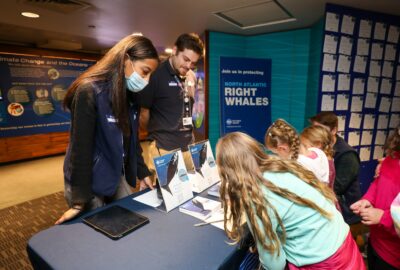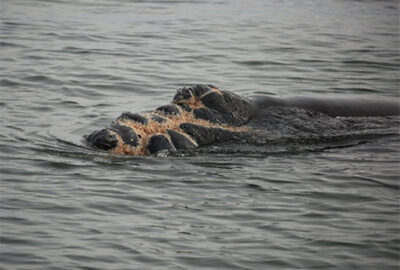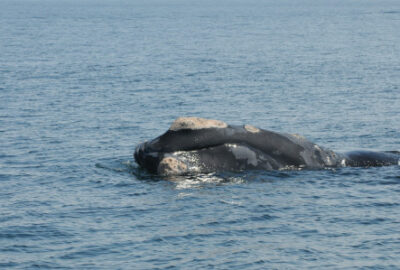Right Whale Day Celebrations Highlight Collaboration to Protect the Species
On the second-annual Massachusetts Right Whale Day, policymakers and advocates underscored the importance of working together to help right whales—and the urgency of implementing protections for the species.
By New England Aquarium on Friday, May 03, 2024

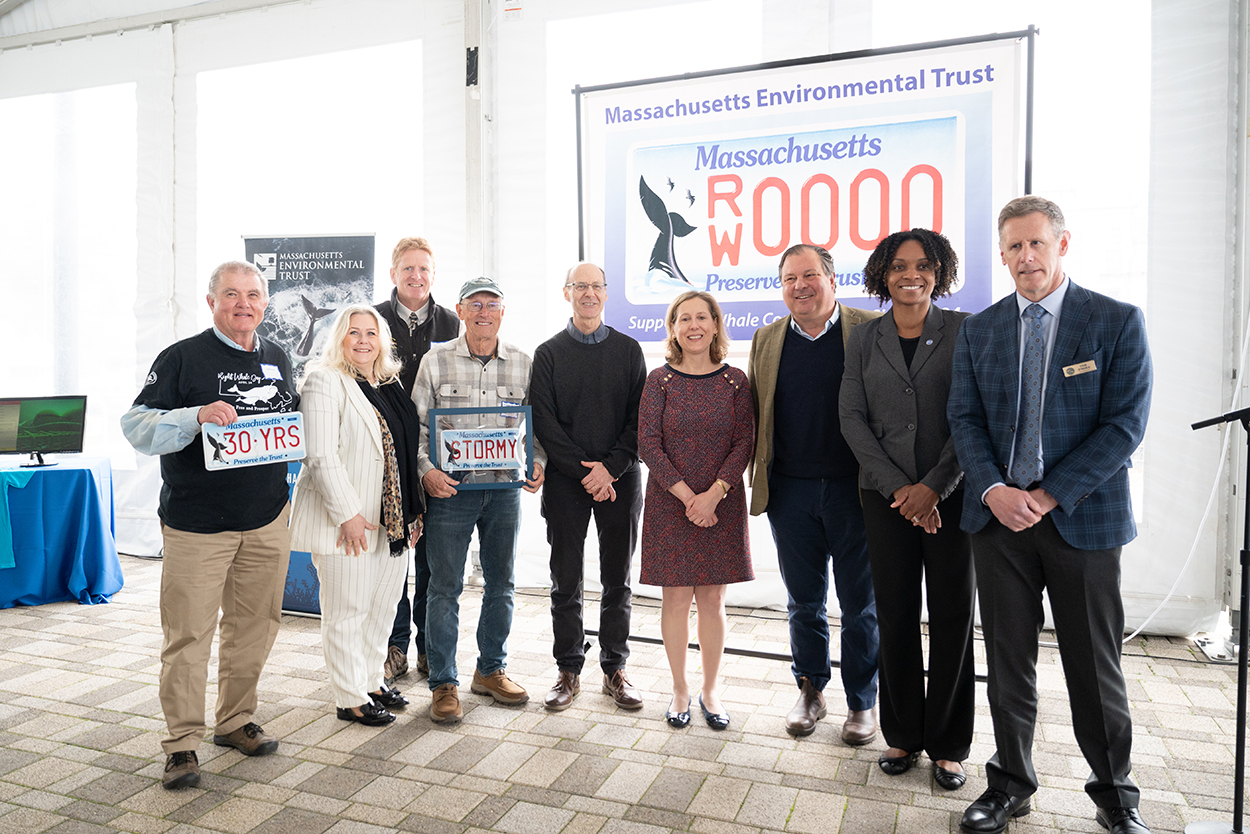
On April 24, policymakers, researchers, conservationists, marine industry experts, and an array of right whale enthusiasts all gathered beneath the Aquarium’s Harbor Terrace Tent to celebrate the second-annual Massachusetts Right Whale Day. The unofficial theme of the event was “collaboration,”—and both the diversity of the attendees and the speeches for the day reflected the importance of that in the ongoing work to protect right whales.
The Aquarium was proud to partner with the Healey-Driscoll Administration for the event, and to be joined by the Massachusetts Environmental Trust, the Department of Fish & Game, and the Division of Marine Fisheries in the day’s celebrations.
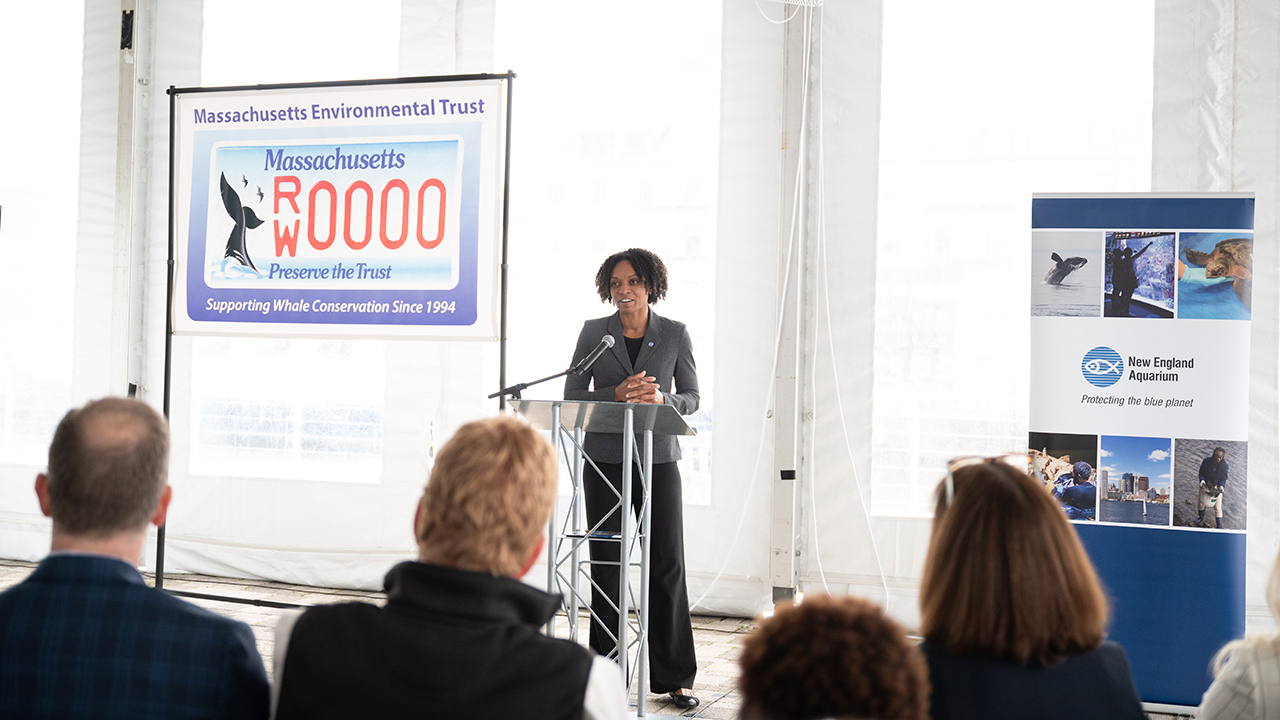
Protecting right whales in Massachusetts
Right Whale Day falls during a critical period for the species, as they begin to arrive in Massachusetts waters in greater numbers after spending calving season off the coast of the Southeastern US. “Over two-thirds of the remaining [fewer than] 360 individuals visit our waters each season,” said Department of Fish & Game Commissioner Tom O’Shea.
Right whales’ migration paths and feeding grounds take them through some of the busiest shipping and fishing areas along the East Coast—earning them the nickname “the urban whale.” The dangers they face from human-caused hazards, including entanglement in fishing gear and vessel strikes, remain high as they travel. That’s why collaboration between policymakers, conservation experts, and industry is essential to ensuring that right whales can thrive in a responsibly resourced ocean.
“Massachusetts has a special responsibility to conserve critically endangered North Atlantic Right whales,” O’Shea added, saying that Right Whale Day is an “awesome opportunity to call attention to the collective work” that legislators and marine industries have undertaken to “ensure the full recovery of this important species.”
“We’re able to uphold incredible protections for this species through seasonal fishing closures, speed restrictions, and use of weak rope to dramatically reduce risks of entanglements and ship strikes,” said Division of Marine Fisheries Director Dan McKiernan. “This is all possible thanks to Massachusetts lobstermen who have made significant sacrifices and are our closest collaborators in devising practical solutions to conserve right whales and sustain this important industry.”

Celebrating decades of work—with more to do
Phillip Hamilton, a right whale researcher in the New England Aquarium’s Anderson Cabot Center for Ocean Life, highlighted what’s at stake for right whales through the story of Wart (Catalog #1140), a female right whale. Wart has given birth to seven calves since 1982, and she has up to 14 grand calves and six great-grandcalves. Her large family tree highlights her contribution to the population—and shows how deeply right whales are affected by the ongoing harm they face. Wart and nearly all her relatives have been involved in an entanglement or boat strike, and, as of today, four are dead or presumed dead.
Hamilton has been researching right whales since 1986 and was among others at the Right Whale Day celebrations who have spent decades advocating for the species. Stormy Mayo of the Center for Coastal Studies in Provincetown received special honors upon his retirement after nearly 50 years as a right whale researcher. Among other accolades, Mayo was awarded a signature right whale license plate—STORMY—from the Massachusetts Environmental Trust. Since 1994, the philanthropic specialty license plate program has given more than $28 million to projects to protect right whales and other endangered marine animals in Massachusetts.
“We’re proud to be here today with our many partners to highlight the progress we’ve made and the critical need for continued action,” said Trust Board & Chair RJ Lyman.
Mayo echoed the sentiment, saying, “These whales will not be saved unless all of these organizations and many more work together.”
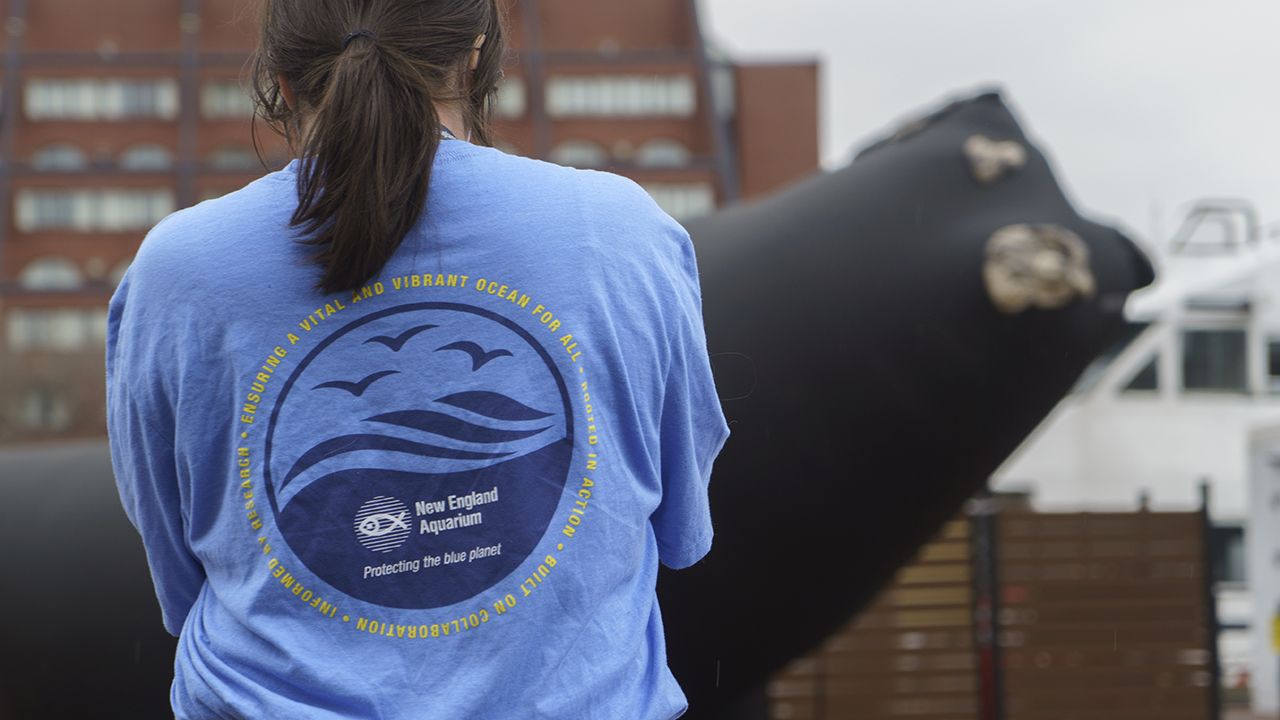
Together, we can help right whales
In one of the closing speeches for the day, Matt Delaney, whose moving encounter with a right whale off Provincetown was the inspiration behind Right Whale Day, reminded those gathered that everyone has a role in protecting these animals. Delaney’s advocacy, working closely with former Representative Josh Cutler (D-Plymouth), turned what had been a family celebration into an official state holiday.
Out on the Central Wharf Plaza and inside the Aquarium, staff also highlighted the public’s role in protecting right whales, engaging with visitors to learn more about our right whale research program and what they can do to help the species.
“Today and every day, we encourage the public to learn more about this critically endangered species—and how human impacts, particularly vessel strikes and entanglements, are causing the right whale population to decline,” said Dr. Letise LaFeir, the Aquarium’s chief of conservation and stewardship. Echoing Hamilton’s earlier comments, she added, “Each North Atlantic right whale holds a rich legacy, and it is our role to remember, acknowledge, respect, and protect these animals.”
The optimism of the celebrations at the Aquarium is tempered by the fact that, as of Right Whale Day, three right whales have died this year because of vessel strike injuries. To reduce the risk of vessel strikes, the National Oceanic and Atmospheric Administration (NOAA) has proposed modifications to the existing vessel speed rule—a process that started over 18 months ago.
In an op-ed for the Boston Herald, which was published on Right Whale Day, Jessica Redfern, the associate vice president for Ocean Conservation Science at the Anderson Cabot Center for Ocean Life, underscored the urgency of the issue. “The delay of these protective measures has put this critically endangered species at continued risk. To increase the species’ chance of survival, speed restrictions need to be implemented immediately,” Redfern wrote. “The New England Aquarium is steadfast in its call for the federal government to issue the revised vessel speed rule.”

